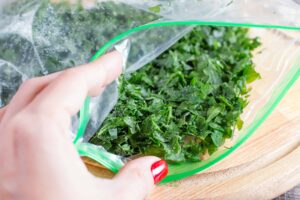How To Freeze Spinach, Kale, and Other Leafy Greens For Later (With Shortcuts!)

If you’ve started incorporating green smoothies into your daily diet, you’ve probably had the frustrating experience of opening your vegetable crisper to grab the ingredients to make your smoothie – only to find that your spinach is slimy or your chard is totally wilted.
While actually making a smoothie every day is fairly simple, keeping fresh greens on hand can be a bit more of a challenge, especially if you can’t get to the grocery store regularly. Don’t worry! I can help so this never happens to you again. Freezing greens is a smart skill for preparedness and for making sure you have the healthiest foods on-hand, even in tough situations.
In this article:
- Can I Freeze Spinach?
- Does Freezing Spinach Lose Nutrients?
- Freezing Spinach & Other Greens: What You Should Know First
- How to Freeze Spinach and Other Greens for Future Use
Can I Freeze Spinach? What About Kale?
Luckily, freezing spinach, kale and other greens for smoothies is a quick and easy way to make sure you’re never caught without the ingredients you need for your favorite healthy drink.
Freezing leafy greens also means that when your backyard garden starts producing an overflowing bounty, or your local farmers market has your favorite organic greens for an unbeatable price, you can stock up on spinach, chard, kale, and more without letting a single leaf go to waste.
You can’t thaw greens for salad, but you can throw frozen greens into the blender, easy!

Does Freezing Spinach Lose Nutrients?
Freezing spinach and other leafy greens for smoothies doesn’t have any significant effect on the vitamins, minerals, and other nutrients, so you won’t lose any significant nutritional value if you use it within a few weeks.
If you wait more than six months to use frozen greens, you will lose some enzymes and vitamins, but I do it all the time--you’re still getting a lot of nutritional density and fiber, and it’s better than throwing the greens away.
Studies have shown that frozen greens offer similar nutritional benefits as fresh produce, specifically when it comes to:
- vitamin C¹ – which boosts your immune system and can help prevent cardiovascular disease
- dietary antioxidants² – which have been linked to preventing many diseases and strokes
- carotenoids and flavonoids³ – phytochemicals that may help prevent cancer
- lutein4 – which can help to maintain healthy eyes
- folate5 – a B vitamin that promotes healthy cells
That’s great news, and it means that freezing spinach and other leafy greens is a smart choice to make sure you always have the right ingredients to get the nutritional boost you need – without missing out on important health benefits of eating raw greens.
Freezing Spinach And Other Greens: What You Should Know First
When you’re freezing spinach, kale, and other greens for smoothies, you have two main options:
- You can freeze your leafy greens while they’re still raw
- You can puree spinach, kale, or other greens with water and freeze the mixture in cubes, for easy use in a green smoothie.
Each of these methods (detailed below) has its own set of benefits, and the decision may ultimately come down to how long you’d like your frozen greens to last in your freezer. But first, a few important caveats you should know:

Should I blanch greens before freezing them?
While you may have heard about blanching your vegetables before freezing them, blanching actually destroys the enzymes that help you break down, digest, and assimilate plant foods. I have dug deep into this advice passed around on the internet, and it seems to be an old “home economics” principle that I cannot find any scientific evidence to support, possibly rooted in the theory (which has been proven false) that blanching neutralizes the oxalates (an anti-nutrient) in many greens.
Enzymes remain after greens are harvested (and even after they’re frozen), so blanching before freezing is not recommended. That’s because the exogenous enzymes in raw greens are one of the main reasons you should eat them plentifully--to decrease the expenditure of finite endogenous enzymes that your pancreas and liver have to release at mealtime.
[Related: How Enzymes Work--And Why You're Probably Deficient]
How long does frozen spinach and spinach puree keep in the freezer?
The good news is that if you plan to use your frozen spinach or other frozen leafy greens within roughly six months, you can freeze fresh produce and it will still be in good condition when you need it.
After about six months, your raw spinach that’s been frozen may start to deteriorate, become freezer burned, or take on an unappealing texture. The same is true for pureed greens, so six months is a good timeline there as well.
[Related: The Last Green Smoothie Recipe Guide You’ll Ever Need]
Can frozen spinach and greens be used in salads?
While frozen greens are a great option for healthy green smoothies, soups, sauces, dips, and other cooked dishes, they’ll never compare to fresh leafy greens when it comes to texture and quality. For that reason, avoiding using frozen spinach, kale, or other greens in salads, garnishes, or recipes that call for fresh produce.

How To Freeze Spinach And Other Greens For Future Use
Method 1: Fresh Freezing
The process of freezing spinach and other greens for use in a green smoothie without cooking it first it is easy. Just follow these instructions for freezing raw leafy greens:
- Wash your produce.
- Pat it dry.
- Put your raw spinach or leafy vegetables into freezer-safe storage bags.
- Seal the bag until there’s about an inch left to seal, then use the small opening to squeeze out as much excess air as possible. This will save you space in the freezer and keep your greens tasting as fresh as possible.
- Place the bags in the freezer in flat layers.
Easy Shortcut For Freezing Bagged Spinach
If you buy pre-washed organic greens, you can make the process even easier. When you notice your greens are starting to wilt or you’re worried you won’t use them before they do, simply empty the whole package into a freezer-safe storage bag, remove excess air, and put it in the freezer. No washing/drying needed!
Using Frozen Greens For Smoothies
No need to wait for thawing! When you’re ready to make a green smoothie, take your frozen spinach, chard, or other leafy veggies out of the freezer and add them to your smoothie just as you would fresh greens. The frozen produce will produce some extra icy thickness to your smoothie and help to keep it cold.

Using Frozen Spinach and Greens In Recipes
If you’re using your frozen greens for soups, pies, or other cooked recipes, you’ll want to thaw them first. You may need to blot off excess water, as well, to avoid adding extra liquid that could throw off the recipe.
Reminder: The enzymes in frozen greens are still useful in helping you digest your other (cooked) food, so using them within six months will give the best results.
Method 2: Pureeing And Freezing Spinach And Other Greens
If you’re freezing your spinach and other greens specifically for making green smoothies, pureeing gives you the simplicity of raw-freezing your leafy greens and having them ready to use for up to a year. Plus, you can puree your spinach with water in the proportions of your favorite smoothie recipe, so when you’re ready to make a smoothie, all you’ll have to do is add the frozen mixture to your blender.
[Related: Make-Ahead To-Go Green Smoothies That Even Kids Will Love]
Because many of GreenSmoothieGirl’s basic green smoothie recipes call for 3 handfuls of greens and 1½ cups water, that’s a great proportion to use when freezing pureed spinach. Just follow these instructions:
- Wash your greens.
- In a blender, combine 3 handfuls of spinach with 1½ cups water.
- Blend until smooth.
- Pour your mixture into ice cube trays. After the cubes are frozen, transfer them to a freezer-safe storage bag.
- When you’re ready to use your pureed frozen spinach or other greens in a smoothie recipe, simply add the correct number of cubes to the blender along with your other ingredients and prepare your smoothie as normal. Then, enjoy!
Tip: After you’ve prepared one batch of this puree using 3 handfuls of spinach and 1½ cups of water, you’ll know how many ice cubes result from this mixture. Then, you can puree larger batches by doubling or tripling the amounts of spinach and water and following the instructions above. When you’re ready to prepare your green smoothie, simply use the number of frozen pureed spinach cubes created by one batch and leave the remaining cubes in the freezer.
Freezing spinach and other greens is a sure-fire way to make sure you never have to deal with greens rotting in the bottom of your vegetable crisper again.
Next time you see any of my top 11 greens to use in green smoothies for a great price, stock up and start clearing some freezer space. With plenty of frozen greens always on hand, your favorite green smoothie will be always in hand in a matter of minutes!
Read Next: How Many Calories Are In A Green Smoothie?

Disclosure: This post may contain affiliate links that help support the GSG mission without costing you extra. I recommend only companies and products that I use myself.

Sources
- DJ Favell “A comparison of the vitamin C content of fresh and frozen vegetables” Food Chemistry Volume 62, Issue 1, May 1998, pages 59-64
- Hunter, Karl and John M. Fletcher “The antioxidant activity and composition of fresh, frozen, jarred and canned vegetables” Innovative Food Science & Emerging Technologies, Volume 3, Issue 4, December 2002, pages 399-406
- Kidmose, U, et al. “Carotenoids and flavonoids in organically grown spinach (Spinacia oleracea L) genotypes after deep frozen storage” Journal of the Science of Food and Agriculture, Volume 81, Issue 9 Special Issue: Nutritional Enhancement of Plant Foods (NEODIET) July 2001, pages 918-923
- Laurie O'Sullivan, Lisa Ryan, S. Aisling Aherne, Nora M. O'Brien “Cellular transport of lutein is greater from uncooked rather than cooked spinach irrespective of whether it is fresh, frozen, or canned” Nutrition Research Volume 28, Issue 8, August 2008, pages 532-538
- Chen, Tung-Shan; Song, Yeong-Ok; Kirsch, Arlene J. “Effects of blanching, freezing and storage on folacin contents of spinach” Information Systems Division, National Agricultural Library
Posted in: Green Smoothies, Preparedness














